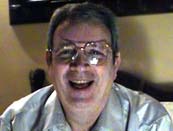Tell us about your break into the industry.
 There were a lot fewer people working when I started, so there was a lot less competition. It seemed easy to me, but later on I realised how hard it was.
There were a lot fewer people working when I started, so there was a lot less competition. It seemed easy to me, but later on I realised how hard it was.
What happened was that Star Trek's first episode came on the air on a Thursday night. I tuned in to watch it with some curiosity and an enormous amount of anxiousness, because there had been so much science fiction on the air that hadn't been very good. I thought, "Well, this show has promise, but nobody's really done science fiction right on television yet."
I looked at it and thought, "Well, gee, that transporter beam, mmm, I don't know, I'd really rather they had a shuttle craft. That guy with the pointed ears, I don't think he's going to work out at all." But I liked what I saw enough that I wrote an outline and submitted it to Star Trek.
They were all bought up for the first season but they said, "Please submit for the second season," so I wrote a whole bunch of outlines which I turned in and they picked one.
Now the way I approached it, and I think this is the advice I would give to anybody wanting to try to get into any TV show, is to realise there's a finite number of stories that they can do. They had twenty episodes a season, so what you have to do is come up with a story that is so good that they actually want to put aside something else they've planned [in order] to do your story.
You're not just competing with what they've got, you're competing with everybody else who's pitching stories, so you actually have to write not just the best story you can but the best story they've ever done. My approach to Star Trek was, "I know science fiction, and I know screen writing."
That was very arrogant of me, but you really need to be a little bit arrogant to think that what you have to say is good enough to justify the expense of hundreds of thousands - now millions of dollars - to make an episode of the TV show. So you have to say to yourself, "What can I do that's better than anything that anyone else has done?" And that means putting aside your own fantasies of, "Gee, how about the teenage girl who falls in love with Spock," and actually do the one that challenges the format of the show, the nature of science fiction, and you.
I would say they picked the right one. I wanted to do the Tribble episode and I had submitted five or six stories, and they picked the right one because that one I felt was totally unlike anything else they had ever done. It gave them all a chance to do comedy and ultimately, and I have to admit even I'm surprised by this, it proved, according to Paramount, to be the most popular episode of the series.
Here's the joke. We had a party at my house when the show aired, on December 29th, and I invited all my friends from college who were still finishing school. One of the folks there was Bob Englund who played Freddie Kruger in all the Nightmare On Elm Street movies. He's a very talented actor, and he said, 'Boy, David that turned out very very nice.'
I said, 'You know I'm proud of it but I'm going to be real honest, I don't think in 20 years anyone's going to remember this, it's just one episode of one TV series and after the last rerun it will be forgotten'. Well, there's never been a last rerun and here it is almost thirty-five years later and everybody knows about this thing. I think everybody on the planet has seen it now and it's a little scary. And kind of flattering too.
